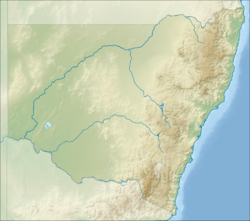The Adjungbilly Creek, a mostly–perennial river[2] that is part of the Murrumbidgee catchment within the Murray–Darling basin, is located in the South West Slopes and Riverina regions of New South Wales, Australia.
| Adjungbilly | |
|---|---|
Location of the Adjungbilly Creek mouth in New South Wales | |
| Location | |
| Country | Australia |
| State | New South Wales |
| Region | South Eastern Highlands (IBRA), Riverina, South West Slopes |
| LGAs | Snowy Valleys, Cootamundra-Gundagai |
| Town | Adjungbilly |
| Physical characteristics | |
| Source | Adjungbilly Swamp |
| • location | near Tumorrama |
| • coordinates | 35°10′44″S 148°24′54″E / 35.17889°S 148.41500°E |
| • elevation | 888 m (2,913 ft) |
| Mouth | confluence with Tumut River |
• location | near Darbalara |
• coordinates | 35°1′28″S 148°11′45″E / 35.02444°S 148.19583°E |
• elevation | 225 m (738 ft) |
| Length | 46 km (29 mi) |
| Basin features | |
| River system | Murrumbidgee catchment, Murray–Darling basin |
| Tributaries | |
| • left | Sandy Creek (Adjungbilly) |
| [1] | |
Course and features
editThe Adjungbilly Creek (technically a river[2]) rises in the Adjungbilly Swamp, near Tumorrama, on the western slopes of the Australian Alps, and flows generally northwest in a highly meandering course before reaching its confluence with the Tumut River, near Darbalara, approximately 2 kilometres (1.2 mi) above its junction with the Murrumbidgee River. The creek descends 664 metres (2,178 ft) over its 46-kilometre (29 mi) course.[1]
See also
editReferences
edit- ^ a b "Map of Adjungbilly Creek, NSW". Bonzle Digital Atlas of Australia. Retrieved 8 December 2014.
- ^ a b "Adjungbilly Creek". Geographical Names Register (GNR) of NSW. Geographical Names Board of New South Wales. Retrieved 8 December 2014.
External links
edit- "Murrumbidgee and Lake George catchments". Office of Environment and Heritage (map). Government of New South Wales.
- Bevitt, R.; Erskine, W.; Gillespie, G.; Harriss, J.; Lake, P.; Miners, B.; Varley, I. (May 2009). "Expert panel environmental flow assessment of various rivers affected by the Snowy Mountains Scheme" (PDF). NSW Department of Water and Energy. ISBN 978-0-7347-5656-5.
